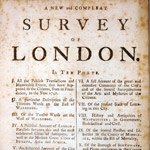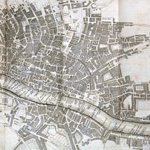 |
 |
'A culture of sociability - hedonism even - was emerging, increasingly secular in form and content, contributing to what has been called the commercialization of leisure.' So Roy Porter wrote on Georgian London. The city was the powerhouse, with theatres, reading rooms, clubs and societies, inns, coffee houses, pleasure gardens, mansions, and people – the glamorous and the lurid, the foreign and the farmer. It certainly justified Dr Johnson's oft quoted: 'He that is tired of London is tired of life, for there is in London all that life can afford.' This unsigned engraving of London shows the extent of the city about 1740. |

